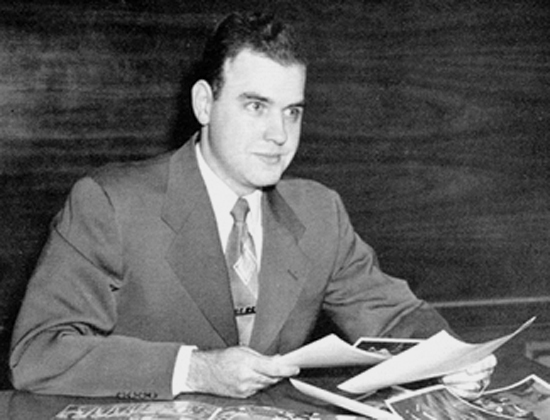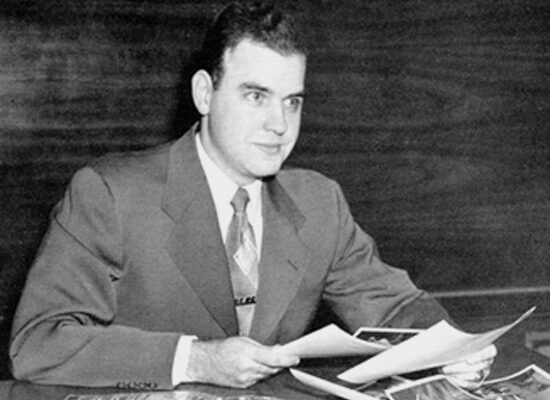I occasionally receive correspondence from Dr. Herb Howard who was the subject of a feature story I did in August 2006 titled, “Early WJHL-TV Pioneer Recalls 1953 Debut of Station.” It was Howard, a former program director at the station, who uttered the first words heard over the new television venture.

Herb Howard as He appeared in 1952
“Several friends,” said Herb, “continue to send me clippings of your “Yesteryear” columns. These are special people who like to remember the good things that have happened there. Now that Elizabethton and Bristol radio and TV station themes have been included in your column, that has prompted me to offer a few additional subjects that I don't think you have done.”
Dr. Howard noted that the most famous of all former announcers in the Tri-Cities area was “the old pea picker” Tennessee Ernie Ford (Ernest J. Ford) who started his career at WOPI, Bristol in the 1930s. He also worked at WROL, Knoxville, and was at that station the morning of December 7, 1941, where he read the attack on Pearl Harbor bulletin over the airways.
“Of the stations still in existence,” said Howard, “the third Tri-Cities station was WKPT in Kingsport (1940). Its slogan was ‘the nation's model station.’ I think the most remarkable thing about WKPT was its organized plan of developing young announcers, usually high school guys who would be given weekend air shifts as they developed skills.”
This unique training program was run by the station's program director, Martin Karant who became identified by his signoff line, “”It's time for me to go for today. But, good Lord willin' and the creeks don't rise, I'll be back with you in the morning after the seven o'clock news.”
According to Herb… “There are several well-known WKPT “alums” who got their careers started in this organized training program: George Sells, who has anchored in several large markets; John Palmer, who became a newsman at NBC; and George DeVault, who stayed with WKPT and for many years now has been the company president and general manager.
“Of course, local guys broke into radio at practically every local radio station. I did it at WJHL as Merrill Moore did at WETB, but WKPT had a well-organized training program.”
Howard mentioned Kathryn Setzer Willis of Johnson City, a woman who broke into pre-war radio at WKPT. She worked as a mailroom messenger at NBC during World War II and was later given her own show playing records over the air for overseas military personnel. Her pleasant voice coupled with her selections of jazz and swing music made her a favorite with servicemen. Later, she did women's programs for WJHL-TV and near the end of her life did some radio programming again for WKPT and its Jonesborough-Johnson City station, WKTP.
“If you want to do something on women in broadcasting in the area,” said Herb, “the expert is Patty Smithdeal Fulton.” In Patty’s superb book titled, I Wouldn’t Live Nowhere I Couldn’t Grow Corn (The Overmountain Press, 1998), she recalled when Hal Youngblood once produced a Saturday night stage show at the Majestic Theatre on E. Main Street. She tap-danced on stage and recalls seeing Kathryn Willis there dressed in a white and silver top hat and tailcoat, carrying a sparkling silver cane and dancing on the stairs.
Thanks to ongoing contributions from people like Dr. Howard, the cherished memories of local radio and television continue to be captured and preserved for future generations.
